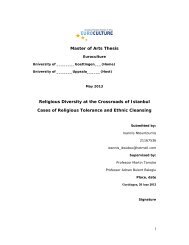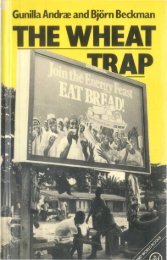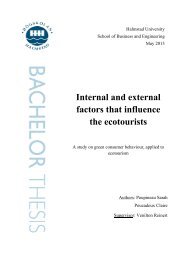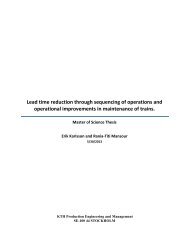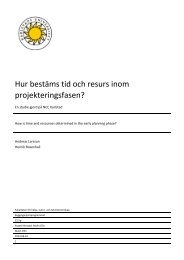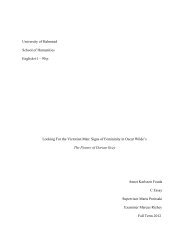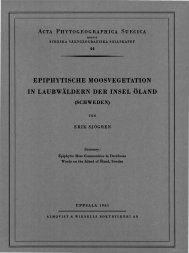fulltext - DiVA Portal
fulltext - DiVA Portal
fulltext - DiVA Portal
- No tags were found...
You also want an ePaper? Increase the reach of your titles
YUMPU automatically turns print PDFs into web optimized ePapers that Google loves.
Similar arguments can also be presented regarding the other pre-school teachers'reflections on pre-school and their actions. Notions and conceptions are affected bythe conditions for pre-schooling, at the same time that they also form part of theconditions. The fact that pre-school teachers in the early 1980s regarded pre-schoolas primarily an institution for adjustment, and in their practice also to a greatextent acted according to these conceptions, is understandable considering thedevelopment within pre-school and in society at large. The teachers' notions andconceptions of pre-school were probably well adapted to their situation.In the long run, it is not satisfactory to carry out work that, in too manyrespects, is in conflict with one's basic views of this particular work. Amodification and an adjustment between thought and action will be the result ofthis conflict. If such an adjustment does not occur, the individuals will find otherstrategies in order to keep the balance between ideas and practical work. Such astrategy could be to work somewhere else in order to find the proper conditions fortheir conceptions. Pre-school teachers with typical "ideas of development" couldact in this way. In this category of conceptions, the responsibility for the work isplaced at the indivual level. That means that the indiviual pre-school teacherwelcomes this kind of solution to her dilemma. The great number of drop-outs andthe transfer of staff in child care in recent years can partly be explained with thesearguments.Pre-school teachers with the conceptions of pre-school as an "institution forcompensation" can be expected to find other strategies in order to create agreementbetween their ideas and their action. According to this category of conceptions,pre-school must be regarded in a social context and the work is not only theresponsibility of the indiviual teachers. In this case, the pre-school teacher willprobably not change workplace or quit. She will probably become involved intrade-union or political work in order to change the working conditions in preschool.This study was carried out with a small group some years after the introductionof the new guidelines when pre-school was going through a lot of changes. In1990, the more eloborated pedagogic programme for pre-school has been availablefor a couple of years, and the local authorities have developed local programmesand guidelines.The results of this study can, of course, not be applied to all pre-school teachersor to teachers in pre-school of today. However, no basic changes have occured inpre-school since the data collecting was made. The demands for effectiveness,stucture and a firm educational management in pre-school are perhaps even moreexplicit than before, at the same time that there is also some apprehension thatchildren do not play as much as they should.However, the descriptions of various categories of notions and conceptions,together with the observations of the pre-school teachers' actions in the group ofchildren, have contributed to the comprehensions of our pre-school. Thedescriptions of the thoughts and actions of the teachers in groups of children canform the basis of more large scale studies that can be applied to the whole staff andto the pre-school of today. The results of this study can also be used to initiate amore balanced debate. We can discuss the actual situation in pre-school instead offocusing on ideas of what it should be like. The results of the interviews and ofthe observations together with the technique of classifying pictures could also be189



